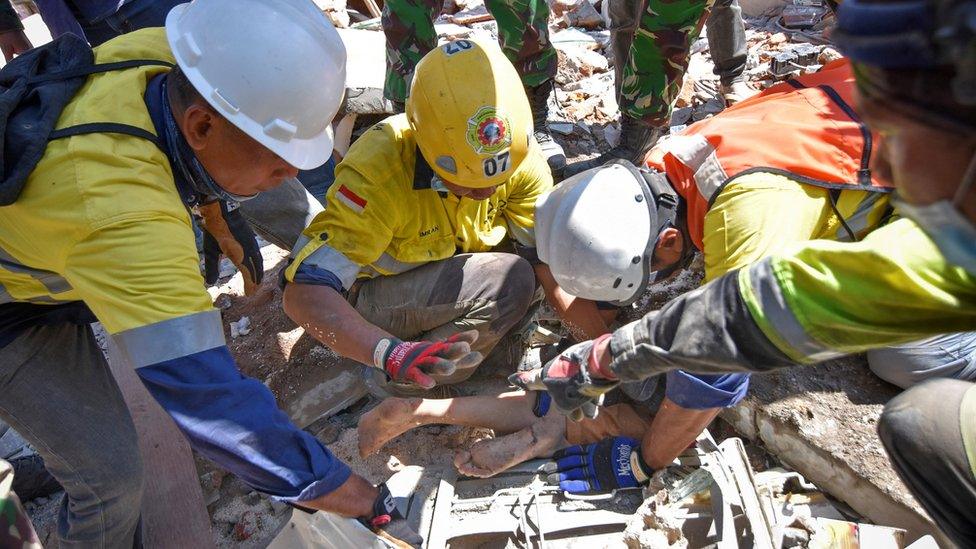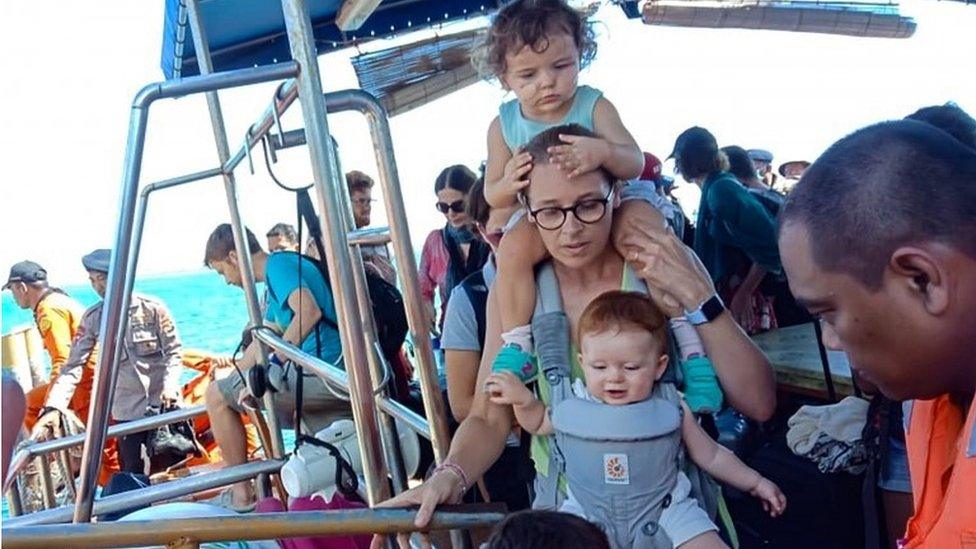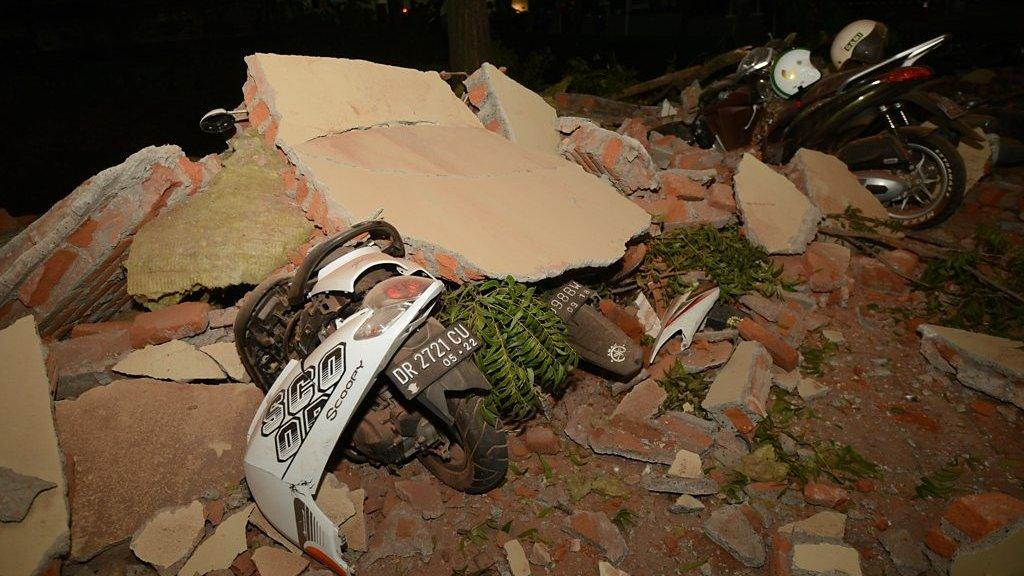Lombok earthquake: Death toll rises to 259 amid rescue efforts
- Published
The moment an aftershock hit Lombok
The death toll from a magnitude 6.9 earthquake on the Indonesian island of Lombok on Sunday has risen to 259 and may go higher still, officials say.
The region has been hit by more than 350 aftershocks, the worst of which struck on Thursday.
The latest tremor had a magnitude of 5.9 or 6.2, according to monitors. It brought down some buildings.
Rescue workers are still digging through rubble and trying to get aid to survivors of the earlier, larger quake.
Officials said of the latest death toll: "This number will continue increasing as rescue teams continue to find victims under collapsed buildings."
Indonesia's chief security minister had earlier said 319 people had died, while local media have reported figures as high as 347.
But national disaster agency spokesman Sutopo Purwo Nugroho told the BBC that only 259 deaths had been verified.
The Red Cross says that Sunday's incident was "exceptionally destructive".
Some villages had "completely collapsed", said a Red Cross official in Lombok, Christopher Rassi.
The government says more than 1,400 people were injured and more than 270,000 displaced.
The new tremor on Thursday hit off the north-west coast of Lombok, sending people running into the streets in panic. No tsunami warning was issued.

'I ran as fast as I could'
By Mehulika Sitepu, BBC News, Mataram
More than 350 aftershocks have struck since the quake on Sunday. Usually it feels like the ground is gently swaying. But Thursday's aftershock was different.
In my third-floor hotel room in Mataram, the island's capital, windows smashed, walls cracked and the ceiling started to collapse.
I ran as fast as I could, barefoot, taking nothing with me. The stairs shook as I ran from the building into the street outside, where people were crying. Their fear was clearly visible.
Sturdy buildings such as my hotel, in the north of Lombok and 13km (8 miles) from the epicentre, can withstand such shocks. But the rickety houses where many islanders live cannot. This is why so many people here are now homeless.


Mr Sutopo classified it as an aftershock. A British tourist on nearby Bali told the BBC that it had been felt there, causing people to leave their hotel rooms in the southern resort area of Seminyak.
Emergency workers are gradually starting to reach more remote areas of Lombok as they continue their rescue missions.
But Mr Sutopo said some areas in the north had still not received any aid.
Allow X content?
This article contains content provided by X. We ask for your permission before anything is loaded, as they may be using cookies and other technologies. You may want to read X’s cookie policy, external and privacy policy, external before accepting. To view this content choose ‘accept and continue’.

Lombok is a roughly 4,500 sq km (1,700 sq miles) island east of the slightly larger island of Bali.
Most people live in basic housing in small communities. Tens of thousands are now sleeping out in the open or in the ruins of their homes.

This woman was rescued alive after nearly a week trapped under rubble in Tanjung, North Lombok
"We are still waiting for assessments from some of the more remote areas in the north of the island, but it is already clear that Sunday's earthquake was exceptionally destructive," said Mr Rassi.
"I visited villages yesterday that were completely collapsed," he added, while other teams in East and North Lombok had reported villages where 75% of homes were damaged.
With hospitals and clinics also affected, many of the injured have had to be treated in the open air or in makeshift clinics.
Imam stays as quake hits Bali mosque
Sunday's quake came only days after a slightly smaller one, which killed at least 16 people. There are growing concerns that the important tourism industry will be badly hit at what should be a busy time.
Thousands of tourists visiting Lombok - as well as the nearby Gili Islands and Bali - have been evacuated or have chosen to leave since the weekend.
"We've had light earthquakes in the past, but never anything like this," hotel chain owner Marcel De Rijk told Reuters news agency.
"We've lost a lot of bookings and future guests are in wait-and-see mode. I don't think people will choose Lombok anymore this summer."
The quake struck at 19:46 local time (11:46 GMT) on Sunday at a fairly shallow depth of 31km (19 miles).
Indonesia is prone to earthquakes because it lies on the Ring of Fire - the line of frequent quakes and volcanic eruptions that circles virtually the entire Pacific rim.
More than half of the world's active volcanoes above sea level are part of the ring.
- Published8 August 2018

- Published7 August 2018

- Published6 August 2018

- Published7 August 2018

- Published5 August 2018
